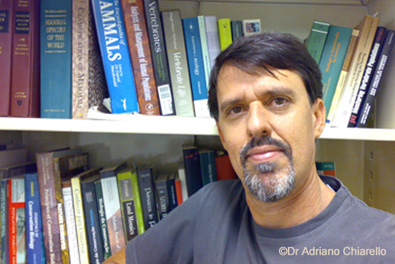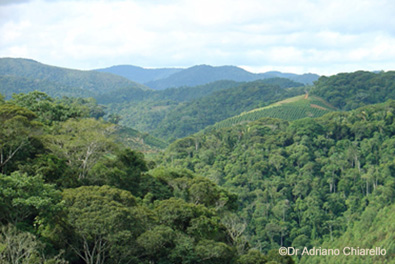EDGE has recently received information from Dr Adriano Chiarello who is studying the Maned three-toed sloth (Bradypus torquatus) in Brazil. We felt that this essential research on one of the Top 100 EDGE species is important to highlight. Assimilating ecological data on a cryptic species is crucial in order to determine threatening processes and for the development of comprehensive management and conservation action plans.
The following information is a brief description of the work he is currently carrying out.
The maned three-toed sloth is endemic to the Brazilian Atlantic Forest and endangered with extinction due to deforestation and population isolation. Although advancing, information available on the species is still incomplete for a detailed understanding of its ecology.
Our project is being developed in the montane region of Espirito Santo state in south-eastern Brazil, one of the main strongholds of the species.
The main objective is to explore sexual differences in ranging patterns, species dispersal and mating system of this species. For this we plan to use two complimentary tools: the GPS-based radio telemetry for a detailed mapping of home range, and the use of molecular markers to determine kinship and level of philopatry (which is the tendency of a migrating animal to return to a specific location in order to breed or feed) between sexes. These aspects are fundamental for elucidation of the real conservation status of maned sloths as well as for elaboration of on-the-ground conservation strategies such as reintroductions and translocations.
For further information on this project or ways you can help please contact:
Dr Adriano G Chiarello bradypus@pucminas.br or Fabrício R. dos Santos and Paula Lara Ruiz (Genetics) fsantos@icb.ufmg.br.
This important research is being funded by a grant from the PROGRAMA DE ESPÉCIES AMEAÇADAS, FUNDAÇÃO BIODIVERSITAS (Brazil) and logistically supported by VALOR NATURAL (Belo Horizonte, Brazil), PONTIFÍCIA UNIVERSIDADE CATÓLICA DE MINAS GERAIS (Belo Horizonte, Brazil), MUSEU DE BIOLOGIA MELLO LEITÃO (Santa Teresa, Brazil) and INSTITUTO DE PESQUISAS DA MATA ATLÂNTICA (Vitória, Brazil).




